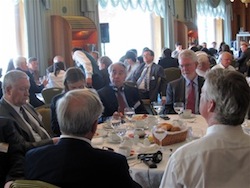The U.S. and Russia: Towards a New Era of Arms Control
June 28, 2010
Featured Image
Today's top nuclear policy stories, with excerpts in bullet form.
Stories we're following today, Monday, June 28, 2010:
Shaping a Common Vision Between Russia and the United States - Remarks by Assistant Secretary of State Rose Goettemoeller at a Ploughshares Fund-PIR Centre Conference in Moscow [link]
- I am pleased to report that much has happened since the Treaty was signed in early April. We worked quickly to prepare the Treaty ratification package for the United States Senate.
- Senator Kerry has announced that he intends to put forth the “resolution of ratification” for a full Committee vote before the Senate takes its August break.
- In my view, it is no accident that we were able to complete this treaty quickly. New START reflects the determination of our two governments to begin a new era in our security relations, one of greater openness and cooperation.
- As we say in the preamble to the Treaty, we see it as providing new impetus to the step-by-step process of reducing and limiting nuclear arms with a view to expanding this process in the future to a multilateral approach.
- We will also seek to include non-strategic and non-deployed nuclear weapons in future reductions. Such steps would truly take arms control into a new era.
US Officials Strive for New START - Interview with Joe Cirincione on Russia Today [link]
- Joseph Cirincione, the President of the Ploughshares Fund says ratification won't be easy, but it will benefit the whole world.
- “There will be problems ratifying the treaties. There are some in the Duma and in the US Senate that still cling to the Cold War doctrines – these conservatives from both countries still want to maintain large US arsenals, but they are a minority,” Cirincione told RT.
- “I believe that the broad and growing consensus in both countries is that we had to proceed step-by-step to reduce and eventually eliminate these weapons.”
- Watch the full video below:
A Bear in The Woods - David Hoffman for Foreign Policy [link]
- Last week, a group of Russian and American specialists sat down to talk about the future of nuclar arms control, and many of them touched on the need to rethink deterrence.
- The session was sponsored by the PIR Center, a think-tank on security and nonproliferation issues in Moscow, and the Ploughshares Fund.
- The agenda for the next arms control talks is long and troublesome: missile defense, tactical nuclear weapons, nukes in reserve, conventional weapons, and more. But the biggest question remains: who is the bear in the woods today, and do nuclear weapons deter them in any way?
- With a fresh sense of the genuine risks we face, both countries could certainly find a way toward far fewer nuclear weapons than they possess today.
5 Myths About Getting Rid of the Bomb - Barry Blechman and Alex Bollfrass in The Washington Post [link]
- The existing nuclear powers resist disarmament because they believe, or claim to believe, in a number of myths about how easy bombs are for rogue regimes to get -- and how useful they are once in hand.
- When countries get the bomb, it's because the rest of the world is unwilling to stop them, not because everyone is caught by surprise. No country has ever fielded operational nuclear weapons without the United States knowing about the program beforehand.
- States with nuclear weapons maintain they are the ultimate insurance policy against fighting, or losing, a war. Recent history suggests otherwise: Nuclear powers have fought and even lost a number of wars during the atomic age.
- As demonstrated by our non-use of nuclear weapons for 65 years, nuclear weapons are worthless on the battlefield and any threat to use them in most situations short of war is simply not credible.
- No wonder so many military officials would rather devote fewer resources to our nuclear arsenal and more to the weapons and equipment they actually use.
G8 Calls on Iran to Hold "Transparent" Talks - Agence France Presse [link]
- G8 leaders Saturday urged Iran to hold a "transparent dialogue" over its suspect nuclear program, as Iranian leader Mahmoud Ahmadinejad prepares to unveil his conditions for talks.
- "Our goal is to persuade Iran's leaders to engage in a transparent dialogue about its nuclear activities and to meet Iran's international obligations," the leaders of the Group of Eight richest nations said.
- Iranian President Mahmoud Ahmadinejad said on Thursday that Iran will next week lay down its conditions for talks with the world powers.
A View from the Dark Side
New START: Potemkin Village Verification - The Heritage Foundation [link]
- The New START Treaty’s verification regime is not even a pale reflection of the verification regime for the original START Treaty.
- While it is not known what the Obama Administration proposed for New START, they certainly did not come away from the negotiating table with a treaty and a verification regime appropriate for low levels of nuclear forces.
- The New START verification regime is not sufficient to detect large-scale cheating by the Russian Federation. As past experience has shown, inadequate verification measures are likely to be exploited.
- To state that this Treaty begins to establish a basis for further reductions leading toward eliminating nuclear weapons is absurd.



